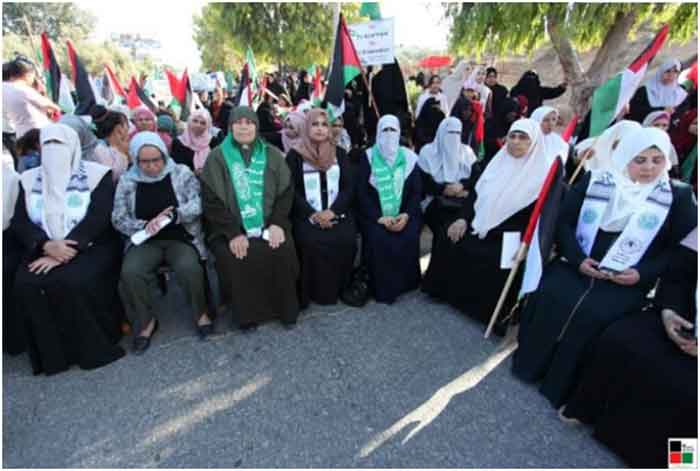
“Having Palestinians, Africans, Asians, Latinx, Muslims, LGBTQIA folks, etc., in the NYCP Dept. doesn’t make it less brutal, violent or corrupt,” writes Mawusi Ture, sister of the late Kwame Ture/Stokely Carmichael and organizer for Black Alliance for Peace (BAP).
Ture’s words refer to the promotion of Palestinian American Filastin Srour to captain, making her the first woman of Arab descent to reach one of the highest ranks in the NYPD. Rather than focusing on Srour’s achievement (or not) as an individual Palestinian woman, it’s more productive to question whether the inclusion of people of color within various institutions leads to real change within the settler colonial state.
In this case, NYPD’s relationship with Israel produces an already murky situation present before Srour’s promotion. As Aviva Stahl explains, a report by Jewish Voice for Peace (JVP) looks into the relationship between NYPD’s training program in Israel and increased discrimination against Muslim communities by the city’s police.
Specifically, the “Deadly Exchange” report details how the programs have encouraged police officials in New York to introduce Israeli surveillance, racial profiling and protest repression tactics into their strategy, thereby adding to a history of suppression against communities of color that Nada Elia explains existed long before creation of the Zionist state of Israel.
Nevertheless, Ramzi Kassem, a professor at CUNY School of Law, noted in an email to Stahl, that “New Yorkers, who are reminded by every passing police cruiser to expect ‘Courtesy, Professionalism, and Respect’, now know that the police force they pay looked to a repeat human rights violator as a model.” Moreover, he concluded that “drawing inspiration from Israeli military practices in the Occupied Palestinian Territories casts the NYPD in the role of brutal occupying force and the areas where American Muslims live as occupied foreign territory.”
It’s unlikely that the creation of more diverse institutions within the settler colonial state will result in an end to structural racism. Thinking otherwise is a product of American individualism, which, according to activist Carmen Stone, “supports and perpetuates structural injustice.” Moreover, she continues, “we cannot separate american individualism from white supremacy, class, cultural and gender domination. The individualist mentality harms the collective. Particularly the most vulnerable members of the collective.”
In this vein, activist Siihasin Nazba (Diné, Nakaii/Chicanx & Mescalero Apache) believes that “we shouldn’t individualize people within genocidal institutions and separate them from the violence perpetuated by these institutions.” Moreover, Nazba holds that there are “no good police officers, as they are agents of the state and uphold values of white supremacy, colonialism, capitalism (profits and property over people) and imperialism (exploitation of labor, land and resources internationally for profits).”
In Albuquerque, New Mexico, where I live, the liberal Democrat Mayor Tim Keller recently unveiled the Albuquerque Police Department (APD) Youth Leadership Lowrider car at an auto show at Balloon Fiesta Park.
Ironically, at the same time that Keller introduced the special car as a bridge between the low riders and the police, that same community was organizing “Take a Stand,” a cruise and possible protest to highlight what many perceived as an effort by APD to crack down on “iconic lowrider cruises” in Downtown Albuquerque. Responding to complaints about noise and crime, APD apparently cracked down on the very symbol that they sought to appropriate for their own purposes.
In their recently released The Red Deal: Indigenous Action to Save Our Earth (2021), The Red Nation (TRN) collective explain that politicians use the term “reform” as an equivalent to social change by asking the elite to implement harm reduction that might gradually filter down. This approach, they conclude, “attempts to treat the symptoms of a crisis, rather than the structures of power that create crisis in the first place” (p. 36).
For example, reformers appointed a Palestinian woman to a high position in NYPD, but did not question how that would change the real problems that exist between the police and the Muslim community. In this case, The Red Nation would ask instead: “Why do we need the police” (p. 37)? Instead of providing adequate housing, healthcare, and food, policies that would go a long way towards reducing crime, reforms, conclude the collective, “give us more cops, more soldiers, and more cages” (p. 37), a situation that is true not only in this country but in all settler colonial countries abroad.
There was a similar conversation during the last Israeli elections about which candidate might be better for the Palestinians, when the most reasonable answer was neither. According to Ramzy Baroud, who described the recent electoral season as Kafkaesque, whoever won the election would most likely not change the right-wing position of the government. As for “ending the Israeli occupation of Palestine, dismantling apartheid and, with it, the illegal Jewish settlements,” that remains up to Palestinians to decide, as they demonstrated in the recent Unity Intifada.
In an article written shortly after the third round of parliamentary elections in 2020, Lana Tatour explores the significance of the Joint List, an alliance of four Palestinian parties in Israel. Seen as the “last hope” for liberal Zionists, Tatour points out that Israeli politics are primarily a Zionist space, where Palestinians are not seen as “legitimate actors.” Like in American institutions, the problem, she claims, is structural, embedded in the racial hierarchy of the colonial state itself.
Therefore, Tatour poses two questions related to Palestinian’s relationship with the state: “Are we merely discriminated-against citizens, who can fight for justice and equality from within the system, or are we colonised subjects in a system that will always reject us?” Rather than calling for a boycott of Israeli elections, she calls on her readers to “forgo the illusion of inclusion, to think outside the parameters of the Israeli state and Israeli citizenship, and to mobilise around a radical project of decolonisation.”
“Today’s pundits,” writes Steven Salaita, “imagine that institutions of the American state can be made to facilitate decolonization,” which is no more likely here than the Zionist state in occupied Palestine. Nevertheless, Salaita notes, they advocate reformist measures that are not likely to succeed: “Vote, they implore. Canvass for the superior class of Democrat. Educate our rulers. Celebrate representation in the very institutions that abet the Zionist entity.”
While Salaita concludes that “it’s pretty clear that maintaining a proper anti-Zionism in the U.S. metropole has become all but impossible,” his own presence in this essay speaks otherwise. “Anti-Zionism isn’t simply a politic,” he explains, “it is a sensibility, an attitude, a worldview. It is a refusal to accept any society predicated on suffering and displacement.” It seems to be alive and well in his own writing, in statements issued by The Red Nation, and activists around the world who understand that inclusion in the system they oppose will not bring about liberation.
A TRN statement written shortly after the 2020 election claimed that inclusion of women and minority politicians within the “US imperial establishment” does not equate to progress. “Representational politics that advance imperialist and neoliberal agendas,” they continue, serve the interests of the elite by “reinforcing those very same agendas by creating the illusion of progress in the form of an elite minority stratum, aligned with settler-colonialist capitalist class politics. As such,” TRN explains, “they are counter-revolutionary politics.”
“Communalization,” concludes the statement, “is both an Indigenous legacy and an ongoing set of practices that the US colonial project has tried to destroy from its inception.” It is the very opposite of the excessive individualism that Carmen Stone opposes, and as such runs counter to the notion that inclusion of people of color in mainstream institutions will lead to progress. Efforts to organize communally endure, TRN maintains, and this “point[s] us all, Indigenous and non-Indigenous, towards a better future.”
Benay Blend earned her doctorate in American Studies from the University of New Mexico. Her scholarly works include “Rethinking Resistance: An Ecofeminist Approach to Anti-Colonialism in Louise Erdrich’s Future Home of the Living God and Oreet Ashery and Larissa Sansour’s The Novel of Nonel and Vovel,” in Douglas Vakoch, editor, Ecofeminist Science Fiction: International Perspectives on Gender, Ecology, and Literature (2021. She has also contributed articles to The Palestine Chronicle.
















































